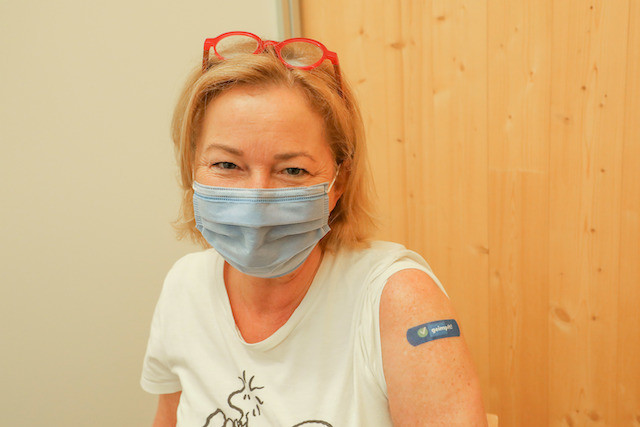Infection figures remain high, as do the number of hospitalisations, particularly in intensive care. Isn't the easing of anti-covid measures premature?
Paulette Lenert: The incidence rate is not determining in itself because the consequences will change with the vaccination effect: you will have less effects in hospitals with an incidence similar to that of some months ago.
We are observing, with the current stability, a decrease in new infections among vulnerable categories, those that end up in hospital. So the situation is improving.
But, with these very high peaks, isn't the risk of a rebound high?
There is always a risk of going back into exponentiality for one reason or another and having to change everything again. And the new variants can be disruptive.
But we never had a ‘zero covid’ strategy: we try to flatten the curve to avoid having too many people at any given time in our hospitals.
And the epidemic situation seems stable. The R factor is below 1 [which means that an infected person infects less than one person on average, and that the epidemic is on the decline, editor's note]. The presence of the virus in wastewater is stable. So it's consistent.
Do the new variants worry you?
Yes. So far, we have been able to break all chains. It seems under control. But we must always remember that we are in Luxembourg, which is not a small, closed island, so there is a risk of importing variants. We have to be clear-headed.
This strategy of mitigating the virus while letting it circulate, even if it helps protect hospitals, is causing severe cases, deaths--more than 800 now in the country. Aren’t we trivialising these daily deaths?
Not at all. Because what you also have to look at is excess mortality, not just the deaths per se. And on this point we are [doing] pretty well on the whole pandemic. There were two small outbreaks in which we went into excess mortality.
So, yes, it is shocking to say 800 deaths. But what does that represent compared to the average? You have to take some distance, compare what is comparable. In other years, it's not like no one died either. This is how we will have to measure, once the pandemic is over: see globally what the excess mortality was. The goal is obviously to keep it modest.
After more than a year of the pandemic and restrictions on freedoms, have you been afraid of witnessing scenes of explosive protests, as was the case in Belgium and Germany?
Less, because we tried to keep as much freedom as possible. The stores remained open, we were able to go to the movies… The curfew--I don't want to trivialise it, but no matter how much we complain, it starts at 11pm, inot 6pm or 7pm, and that's a big difference. When you compare the severity of the measures, it is much more nuanced in Luxembourg. This allows you to live more or less normally.
What will the next stages of deconfinement consist of?
Everything is being considered. There is the curfew, the hospitality sector, home visits, gatherings, we can pull levers on sport and culture. I think there are at least two or three more steps...
Is decision-making at this level collegial...?
It's always consensual. Preparations are being made at the level of the two presidents of the crisis team, namely the high commissioner, who reports to the prime minister, and myself. Then, an interministerial group will do an analysis of the situation and make a proposal. And this is what we are presenting to the government.
Can discussions be lively within the governing council?
Like everywhere. We are human beings. But I have to say that during the pandemic there was enormous solidarity. I didn't get back-stabbed. Other countries are more in the electoral process right now...
Are there no differences of opinion between the departments?
Quite frankly, no. I know everyone wants to [assume] quarrels, but there aren't. It is true that it is quite consensual. There is confidence, a certain routine...
And, at the level of the ministry of health... we have the same purpose as everyone else: that the country does well. If we open too quickly, it will fall back on us, and it's not sustainable, so we really try to think together.
Because it's not as if I don't care about companies shutting down. Just because I'm minister of health doesn't mean I overshadow all of this. Mental health, crumbling livelihoods, it's a whole. A pandemic, it's a whole that must be managed. And everyone tries to contribute to the reflection. Everyone has the same will to get out of it. It’s not political in itself.
Regarding the clusters in nursing homes, do you judge the controversy that took place as legitimate or purely political?
Both. It is completely legitimate because it is dramatic, it generates emotions, there are deaths, it is painful. It is shocking when there is an accumulation of deaths. That we try to understand, [which] is normal.
But the speech got sour at one point. Call for an investigation, yes. But to ask for a resignation before the investigation is finished… it's still very political to claim that...
At the beginning, the tendency was the opposite: we were criticised for preventing visits, for being too severe. A whole section of the population stood up saying old people should not be imprisoned, that this is tragic ... Now there are a lot of deaths and people are asking: is it strict enough? Has everything been done?
But that it is a matter of concern is human, is normal. Quite frankly, I prefer that--it would worry me more if everyone was indifferent.
This article was originally published on Paperjam and has been edited and translated for Delano.
